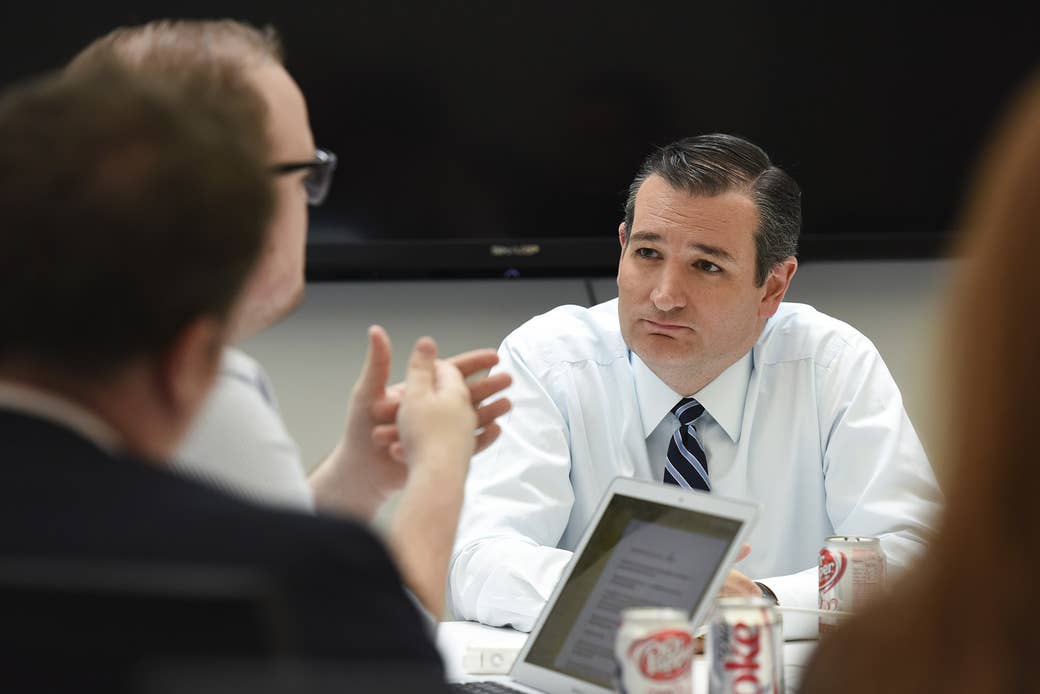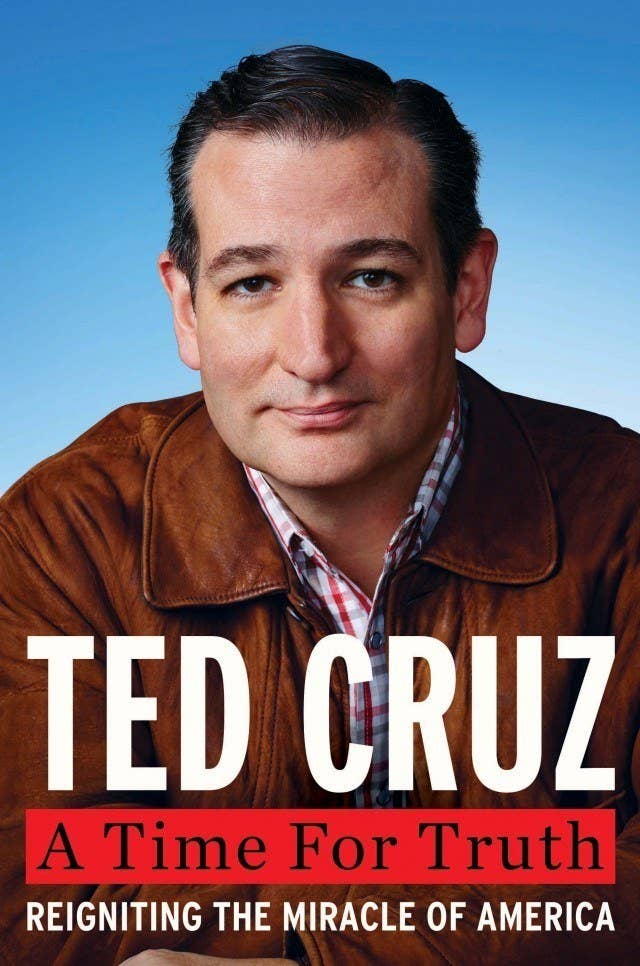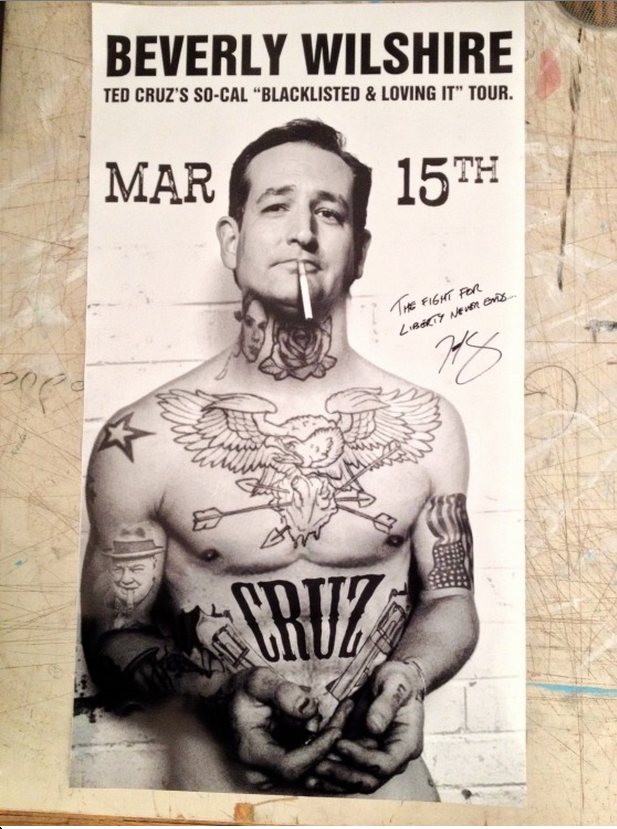
Ted Cruz is a populist, so the first thing he does when he wakes up every morning is reach for the iPhone on his nightstand and scroll through his @ mentions on Twitter. The cascading column of messages directed at the conservative firebrand is not exactly a hallelujah chorus. There are tweets from adoring tea partyers, of course. But there are also strangers calling him "terrifying," and "disgusting," and "insane," and "a pathological liar," and "a religious zealot dancing to the paymasters" (to take just a few examples from Monday). He revels in the onslaught.
"I read every leftist attack," Cruz boasted in an interview with BuzzFeed News. "And actually my team will tell you, some of them — particularly the clever lefties — I laugh at." He maintains two Twitter accounts, one dedicated to his work in the Senate and the other to his presidential campaign, and he checks both frequently. Like any denizen of the internet, Cruz confesses that he sometimes has to ward off a nagging impulse to engage with the Twitter trolls hurling insults at him, but he remains committed to the morning ritual. Why? "I believe those in elected office should listen to the people," he said, "and social media is an avenue for doing that." He's also preternaturally good at it.
More than perhaps any other figure in American politics at the moment, Cruz has proven himself to be a true-blue native of the social web — a politician who thrives on GIFable theatrics, shareable spontaneity, and clickable appeals to the kind of raw emotion and visceral identity that dominates Facebook feeds. His unmatched ability to galvanize and command a right-wing army of avatars has already played a key role in his political ascent. But in a presidential race that will be fought largely on the battlefields of social media, Cruz's unique instinct for virality could be more disruptive than many realize.

Those instincts were on vivid display Monday, when Cruz visited BuzzFeed's New York headquarters as part of a promotional tour for his new book, A Time for Truth. The besuited candidate — perhaps best known for leading the conservative crusade to defund Obamacare in 2013 that culminated in a government shutdown — strolled breezily around the office. At one point, while posing for a photo, he spotted a life-size cardboard cutout of the Dos Equis "Most Interesting Man in the World" and pulled it into the shot with him, declaring, "We Latins need to stick together!" While recording a short video with some of BuzzFeed's producers, he was notably hands-on, tweaking the script on the fly to make the jokes his own, and tossing out self-deprecating ad libs. And when he sat down for a wide-ranging news interview that covered many of the day's most charged political debates, the senator reserved his most palpable excitement for recounting successful memes he had launched and hashtag wars he had won.
Cruz's knack for fostering buzz within the internet's various political villages has been well-documented, with a track record that ranges from small, self-aware gags (this hypnotic six-second video of Cruz waving an enormous American flag), to high-profile stunts (reading Green Eggs and Ham to his young daughters from the Senate floor), to dramatic, unscripted confrontations (getting booed off stage by a conference focused on Middle Eastern Christians after lamenting that some in the audience were "consumed with hate" and not sufficiently supportive of Israel).
Since entering the presidential campaign earlier this year, the fruits of these efforts have been borne out in a weekly report produced by Facebook that monitors how much discussion each 2016 candidate is generating on the platform. In an incredibly crowded Republican field — where candidates tend to see short-lived spikes in social media chatter when they kick off their campaigns, and then quickly fade into background noise — Cruz has sustained a consistently high level of attention. In one typical week earlier this month, he clocked over a million Facebook "interactions" and was overshadowed only by Jeb Bush (a top-tier candidate who had just announced his candidacy) and Donald Trump (a celebrity troll who would eat his own hair to provoke a reaction).
Cruz may only be polling in the middle of the 2016 pack, but on the internet a lot of people are talking about him.
So, how exactly does he pull it off? Cruz answered the question, as he often does, with a story. He recalled that once in 2013, a group of liberal activists were trying to organize a campaign to make the phrase "You Cruz, you lose" a trending topic on Twitter. When conservatives caught whiff of the plan, they began planning a counterattack, rallying the senator's supporters beneath the banner "Cruz to victory." This high-minded battle of ideas commenced as each side began furiously tweeting their respective slogans. When the dust settled, the winner was clear.
"By 6 p.m. that night the hashtag #CruzToVictory was trending worldwide — the second most tweeted thing on the planet," Cruz said proudly. And the liberal hashtag? "Didn't make the top 10 in the United States."
When Cruz finished the story, a BuzzFeed editor present for the interview marveled, "What a world."
Cruz grinned. "It's a wonderful world."
The moral of the story, Cruz went on to explain, was that effective viral movements can't be manufactured by "Soviet-style campaigns" with "politburos up top" handing out marching orders to obedient partisans. (Here, Cruz attempted a Russian accent and began sternly jabbing his index finger into the air, barking, "You do that! You do that!") To mobilize true believers on social media, he said, a candidate has to strike a personal nerve. "It wasn't our idea," he said of #CruzToVictory."We didn't push it. It was organic. But what happened is the activists said, 'Hey, they're coming after us, the conservatives and libertarians.' It was their battle. It wasn't about some politician in Washington. It was about their beliefs and values."

Indeed, one reason for Cruz's omnipresence in the social conversation is that he has fastidiously presented himself as the walking embodiment of tea party conservatism. By refusing to stray even a millimeter from his hard-right positions and apocalyptic rhetoric, he has become a heroic champion to many on the right, and a magnet for animosity on the left. And in communities like Twitter and Facebook — which are still predominantly populated by younger, more secular users preoccupied with social justice causes — Cruz's increasingly successful deployment of right-wing memes is often treated like a hostile invasion that must be urgently denounced. Hashtags get weaponized, screeds fill status updates, and before long, Ted Cruz is going viral all over again.
Last week, as millions of Facebook users applied rainbow filters to their profile photos in celebration of the marriage-equality victory, Cruz gravely proclaimed that we were living through "some of the darkest 24 hours in our nation's history." Rhetoric like that was not entirely uncommon in the immediate right-wing reaction to last week's ruling, but Cruz distinguished himself by doubling down on both style and substance in his interview with BuzzFeed News — resisting the temptation other candidates might have indulged to water down his pitch in the interest of wooing a younger audience.
"I think for millennia, marriage has been defined as the union between one man and one woman, and I'm not convinced those definitions can be magically transformed," Cruz said. He flatly rejected the premise that generational trends in the marriage debate were irreversible, and blamed coastal elites for perpetuating the false narrative. "We do have a lot of folks in the mainstream media and Hollywood who are desperately trying to repeat, over and over again, 'The issue's decided! Everyone agrees! Everyone agrees!' You know, there are a couple of facts that are in somewhat tension with that."
He pointed to the largely unsuccessful track record of marriage equality on state ballot initiatives, and argued that conservative people of faith would not change their religious beliefs simply because of "five unelected lawyers." (In other interviews, Cruz has noted the absence of evangelical Christians in the Supreme Court as proof that the justices are out of touch with the country. But on Monday, he told BuzzFeed News that if he were president he wouldn't go out of his way to appoint an evangelical to the bench, going so far as to call the idea "absurd." He said he would only consider credentials and ability in making his selection, and that the court shouldn't be acting like a legislative body.)
Asked whether he believed his two young daughters would grow up to oppose same-sex marriage, Cruz said they had not brought up the issue yet — the girls are only 4 and 7 — but he added, "Heidi and I are Christians, and we are doing our very best to raise our daughters in a Christian household, where we teach our girls the Bible."
Cruz was similarly doctrinaire in his discussion of religious freedom issues, which he spent years tackling in federal court as a top-flight litigator earlier in his career. In the interview Monday, he decried the "liberal fascism" of those who would legally coerce Christian bakers and florists into providing services for same-sex weddings, and attempted to illustrate his point with a hypothetical. "Let's imagine you had a gay florist," Cruz said. "I know that's hard to imagine. But let's just assume you had a gay florist, and he didn't want to provide flowers to fundamentalist Christians. Now, he's got every right to say, 'That's contrary to my beliefs and I'm not going to provide flowers.'"
But the candidate dismissed questions about how far he would extend religious businesses' right to refuse service. Should an Orthodox Jew be allowed to deny a Muslim, or vice versa? What if an evangelical florist wanted to refuse service to a Catholic wedding? Finally, Cruz demanded, "Have you ever heard of that ever happening? It is a hypothetical that simply doesn't exist."
When affirmative action came up, Cruz argued vigorously against race-based admissions, and warned that de-prioritizing academic merit in selecting applicants would inevitably lead to unintentional injustices. As evidence, he pointed to Ivy League schools that used to enforce "negative quotas" to keep from accepting too many Jews. "We see it now with colleges in California ... negative quotas against Asian students because academically they're excelling."
Cruz, who attended Princeton and Harvard Law School, demurred when asked whether he thought he had personally benefited from affirmative action, saying it was "difficult to say." But, he added, "I can tell you one of the downsides of affirmative action, being a Hispanic man, is over and over again you have people, often supercilious liberals, who would suggest you're only here because of affirmative action." In his book, he writes about a fellow member of the Harvard Law Review who defended the use of affirmative action by claiming that without it, its staff "would be nothing but white, rich men." Cruz was outraged by the implication that he and his best friend, a Jamaican man, were only there to fill racial quotas. He recalled telling off the classmate: "I'm happy to pull out your transcript and my transcript, and let's go head-to-head, big boy. Because you're not going to win that battle."
Though Cruz is a gifted speaker and skilled polemicist, he has a habit of answering interview questions with recitations of his stump speech — a tic that once caused the Weekly Standard writer Andrew Ferguson, who found himself trapped in a car with Cruz droning on, to contemplate how many vertebrae he would damage if he "slipped the lock, opened the door and did a tuck and roll onto the passing pavement." The candidate has not entirely cured himself of this vice. Early in the interview on Monday, Cruz answered a single question about same-sex marriage with a sprawling, uninterruptible discourse that stretched on for almost seven minutes, and somehow managed to tie together Proposition 8, Citizens United, Ted Kennedy, and Fahrenheit 451.
But while Cruz's status as an ideological lightning rod may rely on such rigid rhetorical discipline, his talent for winning the internet depends on a completely different set of instincts. When his interview concluded Monday, Cruz's press secretary presented him with a script — prepared by BuzzFeed — in which he would audition to replace the voice actor behind The Simpsons. Neither the senator nor his aides had agreed beforehand to the stunt, and so the BuzzFeed News team vacated the conference room to let them discuss. From outside, Cruz could be seen hunching over the script, as though seriously thinking it over. But within a few seconds, his press secretary came out to inform us he was a go.
"He's just practicing," she said.
